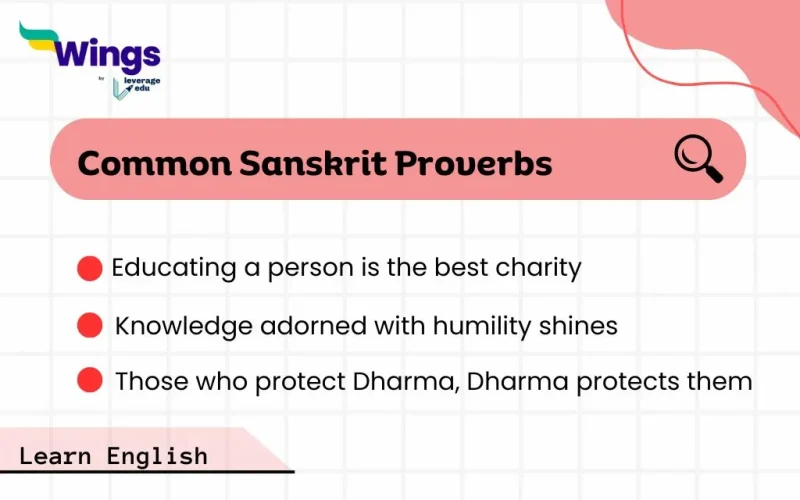Sanskrit proverbs are traditional sayings that convey knowledge and cultural values rooted in ancient Indian philosophy. These proverbs are often brief and packed with deep meanings, reflecting the rich linguistic and spiritual heritage of Sanskrit literature. Studying common Sanskrit proverbs provides insights into timeless principles of life, values, and human behaviour, bridging linguistic and cultural gaps through their universal messages. Continue reading this blog to have a brief knowledge of ancient proverbs from the Indian subcontinent.
This Blog Includes:
Also read: 100+ Common Proverbs with Meaning and Examples
5 Common Sanskrit Proverbs About Life
Common Sanskrit proverbs about life, often concise and profound, provide insights into living with wisdom, mindfulness, and understanding. These proverbs on life encourage us to reflect on our actions, relationships, and the deeper meaning of life itself.
Truth Has But One Color, a Lie Has Many
| Meaning: “Truth has but one colour, a lie has many” indicates that the truth is specific and clear, while lies are often complicated and come in many forms. The truth is consistent while lies can be varied and inconsistent. |
Wisdom is the Right Measure of One’s Strength
| Meaning: “Wisdom is the right measure of one’s strength,” tells that true strength isn’t just about physical power or force. It is about using good judgment, making smart decisions, and knowing when and how to act. Being wise helps you handle situations better and achieve more with less effort. |
Educating a Person is the Best Charity
| Meaning: “Educating a person is the best charity” means that teaching someone new skills or knowledge is one of the most valuable ways to help them. Education can empower individuals, enabling them to improve their lives and the lives of others. Unlike temporary aid, the benefits of education last a lifetime and can create lasting positive change. |
There are None so Deaf as those Who will not Hear Advice
| Meaning: “There are none so deaf as those who will not hear advice” signifies that the people who are unwilling to listen are the hardest to reach. It is expressing that no matter how much you try to help or advise someone, if they don’t want to listen they won’t understand or accept what you’re saying. |
Effort of Hard Work Will Never Be Wasted
| Meaning: “Effort of hard work will never be wasted” implies that when you work hard, your efforts will eventually pay off. Even if you don’t see immediate results, the work you put in will benefit you in the long run. Hard work always leads to some form of reward, learning, or progress. |
Also Read: 11+ African Proverbs About Life to Liveby (with Meaning)
Common Sanskrit Proverbs on Karma
Common Sanskrit proverbs on karma often highlight the importance of ethical conduct, personal responsibility, and the idea that our actions shape our destiny. These words inspire individuals to understand that positive actions lead to positive outcomes, and vice versa. Here are a few of the Sanskrit proverbs that one can refer to:
Treat others as You Treat Yourself
| Meaning: “Treat others as you treat yourself” implies that you should be kind and considerate to other people in the same way you would like them to be kind and considerate to you. It is about showing respect understanding and care for others just as you would want them to show towards you. |
Greater than Heaven Itself
| Meaning: “Greater than heaven itself” is an expression used to describe something extraordinarily impressive, valuable, or significant. It means that the thing being described is so remarkable that it surpasses even the vastness and magnificence of heaven. |
Those who Protect Dharma, Dharma Protects Them
| Meaning: “Those who protect Dharma, Dharma protects them” suggests that when people uphold moral and ethical principles of Dharma, these principles in turn support and protect them in life. It is about the mutual benefit of living a righteous and moral life. |
Knowledge Adorned with Humility Shines
| Meaning: “Knowledge adorned with humility shines” indicates that when a knowledgeable person remains humble and modest their wisdom and intelligence are even more impressive and admirable. It suggests that humility enhances the value of knowledge. |
Yoga is the Cessation of the Fluctuations of the Mind
| Meaning: Yoga is about calming the busy thoughts in our minds. It is like quieting down the waves in a restless ocean so that we can find stillness and clarity within ourselves. |
Also Read: 17 Best Proverbs for Confidence to Boost Your Personality
7 Best Sanskrit Proverbs on Wisdom
These proverbs often convey wisdom in brief and poetic language, making them memorable and impactful. The below table depicts proverbs with their respective meanings:

| Best Sanskrit Proverb | Meaning |
| A bird in hand is better than two in the bush. | “A bird in hand is better than two in the bush” suggests it’s better to have something certain and within your control rather than taking a risk for something greater that you may not achieve. |
| When it is time to die, what can even Dhanvantari do? | “When it is time to die, what can even Dhanvantari do?” refers to the idea that death is inevitable and beyond human or divine control. Dhanvantari is a deity in Hindu mythology associated with medicine and healing. |
| Over-affection is apt to suspect evil. | Being overly affectionate or excessively loving towards someone can sometimes make them think you have ulterior motives or suspect that something bad might be happening. |
| A little knowledge is a dangerous thing. | The proverb “A little knowledge is a dangerous thing” suggests that having a small amount of knowledge about something can make you think you understand it completely which can lead to mistakes or misjudgments. |
| The command of elderly persons should not be called into question. | “The command of elderly persons should not be called into question” signifies that we should respect and not doubt the authority or decisions made by older people. |
| There are no rules to be followed in bad times. | “There are no rules to be followed in bad times” suggests that during challenging situations traditional rules or norms may not apply. It implies that when things are tough one may need to adapt and find solutions outside of usual guidelines or expectations. |
| In illness, bad times and famine, he who sticks by one is the true friend. | This proverb means that a true friend remains loyal and supportive even during difficult times like sickness, adversity, or scarcity. It emphasizes the importance of steadfast loyalty and support in friendships especially when things are tough. |
| Whose intelligence is sparked into life in difficult times, he is the courageous one. | This proverb suggests that when faced with tough challenges, a person’s intelligence and bravery come to life. It means that during difficult times, someone shows courage and uses their intelligence to overcome obstacles. |
Related Reads:
This was all about the Sanskrit Proverbs With Meaning. Hope you understand the concept and know how to proceed. You can also follow the Learn English page of Leverage Edu for more exciting and informative blogs related to grammar.


 One app for all your study abroad needs
One app for all your study abroad needs












 60,000+ students trusted us with their dreams. Take the first step today!
60,000+ students trusted us with their dreams. Take the first step today!